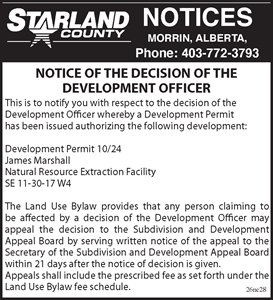
Under Alberta’s new drinking and driving laws, Alberta Sheriffs will soon have equipment to make roadside demands of breath.
The Alberta Legislature passed third reading of Bill 26 on Tuesday night. Under this legislation if a person is found to have a .05 to .08 blood alcohol level on their first offense they could receive a three-day driving prohibition and three-day vehicle seizure; the penalty escalates with repeat offenses. These changes are to provincial laws and are not criminal charges.
The legislation also has more stringent penalties for those with a blood alcohol level over .08.
“This legislation will be a further tool to police to get drunk drivers off the road,” said Jonathan Denis, Solicitor General and Minister of Public Security. “The tougher penalties target drunk drivers who repeatedly put us all at risk. Cracking down on high risk drivers is the right call for Alberta.”
One of these tools will be in the hands of the Alberta traffic Sheriffs.
“The Provincial Sheriffs will be able to further support the drunk driver laws by being able to give drivers suspensions, use screening devices,” said Dan Laville, communications director for the Solicitor General and Public Security. “They can carry the handheld screening device in their vehicle and they can pull over someone who appears to be impaired and check them. If they are between .05 and .08 they can administer the roadside suspension.”
He says they are not able however to pursue criminal charges without involving a police officer.
“If it is over .08 they can contact the RCMP or the police to come and deal with the criminal code infraction,” said Laville. “Once it is over .08 it is a criminal code thing.”
In Alberta, a Community Peace Officer Level 1, often a person hired by a county to enforce bylaws, can be approved to enforce moving violations under the Traffic Safety Act and elements of the Gaming and Liquor Act.
Some can have enhanced authorities that could include Criminal Code Authority granted for the offenses of theft not exceeding $5,000 and mischief not exceeding $5,000. They could also be able to enforce criminal code warrants and investigate and submit reports involving non-injury motor vehicle collisions.
According to Laville, a Community Peace Officer will not be granted the ability to make a lawful breath demand.
“Only Sheriffs will be able to use a screening device,” said Laville.
According to the policy and procedure manual for the Public Security Peace Officer, impaired driving offenses should not be actively sought by a peace officer.
If a peace officer encounters an individual they suspect is impaired, they are to immediately contact the police service of jurisdiction and request assistance. The peace officer may have the authority to arrest the person pending the arrival of the police under the criminal code, but the peace officer may not have the authority to utilize emergency equipment to attempt to stop a vehicle to conduct an arrest.
If police are not able to attend, it is recommended a peace officer administer a 24-hour disqualification.
Laville said it would be some time before Alberta Sheriffs will be equipped with the screening device.
“The next step with the bill having been passed is developing the regulations to support it. An implementation plan is being developed,” said Laville.

















